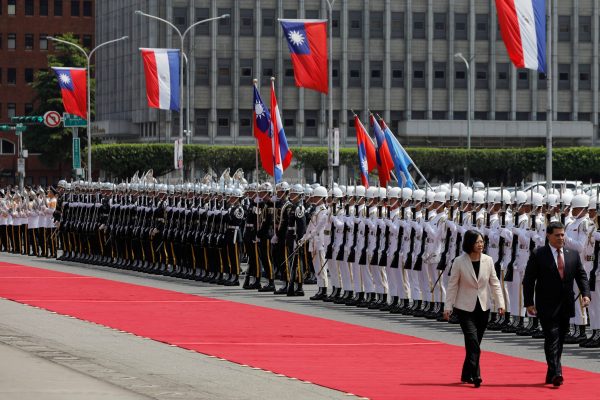Compounding this, Tsai was faced with the monumental task of maintaining the DPP party platform to uphold the cross-Strait status quo despite a recalcitrant China. Due to Beijing’s concern that Taiwan is moving towards ‘peaceful separation’, no significant effort has been made to reopen formal cross-Strait channels of dialogue since they were cut in June 2016. While President Tsai maintained her ‘consistent, predictable and sustainable’ policy towards cross-Strait status relations, she also called for both sides to develop a new model to maintain the cross-Strait status quo, arguing that it was untenable in its current format.
As a result of these tensions, Beijing has throughout 2017 refused to work with Tsai and has further increased its pressure on Taiwan to accept a singular interpretation of the ‘one China’ policy. This has led to instances which have inflamed cross-Strait tensions.
In February 2017 (following similar cases in Vietnam, Kenya, Malaysia and Cambodia) approximately 200 Taiwanese citizens suspected of telecoms fraud in Spain were deported to mainland China — not Taiwan. Then in March, Taiwanese civil society activist Lee Ming-che disappeared while travelling from Macau to Guangzhou and was later confirmed to be in Chinese custody. Lee was accused and later convicted of ‘inciting others to subvert state power and overthrow the socialist system’ through his weekly group chats on Chinese social media regarding ‘Taiwan’s experience with democracy and transitional justice’. Lee was unable to obtain his own lawyer or meet with his wife and advisors, and had to broadcast a public confession on Weibo. The ‘show trial’ was a watershed moment, as it was the first time China had asserted its legal jurisdiction over a Taiwanese citizen.
As well, Beijing also continued to interfere in Taiwan’s bilateral and multilateral affairs. In January 2017, following a visit from the Chinese Foreign Minister Wang Yi, the Nigerian Foreign Minister Geoffrey Onyeama announced that Taiwan would no longer have diplomatic representation in Nigeria. Geoffrey Onyeama instructed Taiwan to move its office from the Nigerian capital Abuja to its largest city Lagos in order for it to function solely as a trade mission with minimum staff. Wang later announced that China would invest US$40 billion in Nigeria. In June 2017, Panama also cut formal ties with Taiwan in favour of China, which is the second-largest investor in the Panama Canal. Beijing also blocked Taiwan’s participation in the World Health Assembly and the International Labor Organization, and Chinese representatives at the Kimberley Process loudly disrupted the welcome ceremony due to the presence of Taiwanese observers.
Despite these challenges facing Tsai, there are two pillars that provide her administration with stability.
First, increasing pressure from China is having an adverse effect on Taiwanese popular opinion towards unification with the mainland. Beijing’s coercive actions frustrate many in Taiwan — particularly the youth population that swept Tsai to power. After the Lee case, many Taiwanese were angered by the heightened contrast between China’s repressive system and Taiwan’s democratic freedoms and by the lack of Beijing’s respect for Taiwan’s electoral system.
Consequently, China’s ‘best efforts’ at reunification are increasing the chances of Taiwan’s ‘peaceful separation’ and have created new opportunities for Taiwan. Tsai’s rather low-key response to the Lee case demonstrated her diplomatic skills in not escalating cross-Strait tensions into a crisis. Beijing’s strangulation of Taiwan’s international lifelines has only intensified efforts to diversify its foreign policy through the New Southbound Policy (which calls for more attention towards Pacific-rim and Southeast Asian nations) and a rejuvenation of Japan–Taiwan relations.
Second, since President Tsai’s election, the opposition Kuomintang (KMT) party has provided no viable opposition to the DPP. The March 2017 indictment of former president Ma Ying-jeou for leaking secret information, and the ongoing Ching Fu scandal further increased scrutiny over the KMT’s closeness to mainland China.In May, former vice president Wu Den-yih assumed the role of KMT chairperson, where he negotiated a return to a centrist party platform. He reinstated Ma Ying-jeou’s model of ‘one China, two interpretations’ based on the 1992 consensus and ended calls for a negotiated peace treaty before eventual unification (as favoured by the previous chairperson, Hung Hsiu-chu). Wu also maintained the KMT’s opposition to independence but reiterated its support for ‘no unification and no use of force’.
These dynamics means that both the DPP and KMT are increasingly weary of mainland interference due to the perception of its influence on local politics. It is clear that this does not bode well for Beijing’s current cross-Strait objectives. It also does not bode well for Taiwan’s desire to maintain the status quo or Tsai’s deft political manoeuvring — Beijing will only increase its diplomatic, economic and military pressure to suffocate Taiwan’s independence.
Sheryn Lee is a Lecturer at the Department of Security Studies and Criminology, Macquarie University.
This article is part of an EAF special feature series on 2017 in review and the year ahead.

